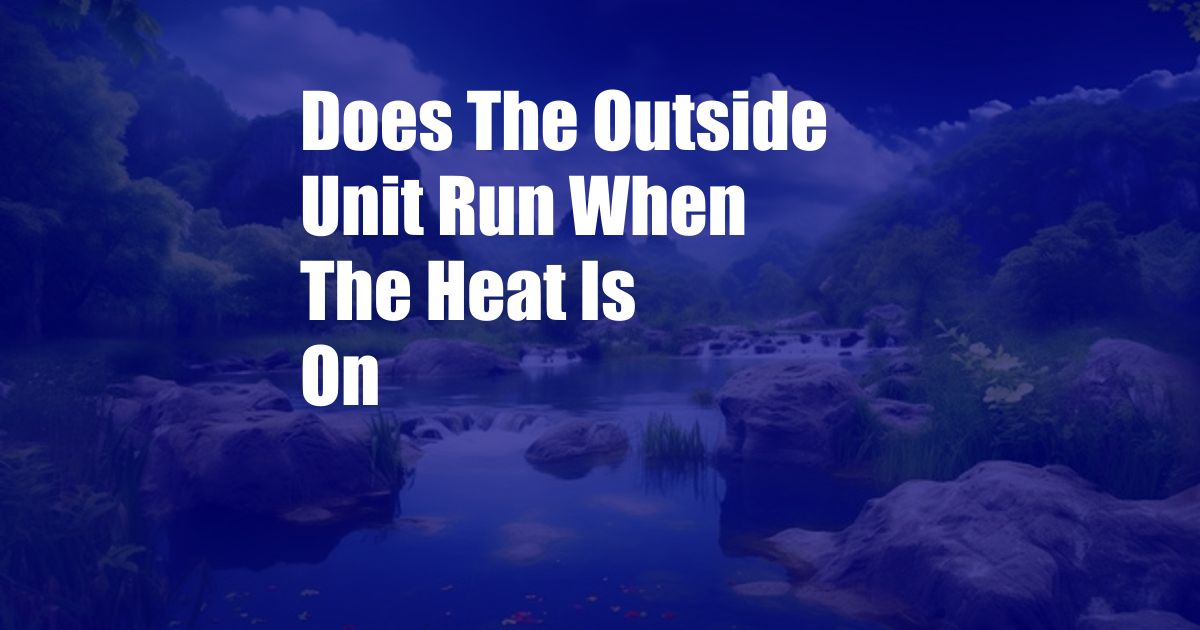
Do Outside Units Run When the Heat Is On?
I remember when I first moved into my house, I was puzzled to find the outside unit of my HVAC system running even when the heat was on. It seemed counterintuitive to me, but after doing some research, I learned that it’s actually quite common for heat pumps to operate in this way during the winter months.
In this article, we’ll delve into the specifics of why the outside unit runs when the heat is on, explore the latest trends and developments in heat pump technology, and provide expert advice on how to maintain your heat pump for optimal performance.
The Role of the Outside Unit in Heat Pumps
A heat pump is a type of HVAC system that can both heat and cool your home. It works by transferring heat from one place to another, using a refrigerant that changes from a liquid to a gas and back again.
The outside unit of a heat pump contains the compressor, condenser, and expansion valve. These components work together to move the refrigerant through the system, transferring heat from the outside air to the inside of your home when you’re heating, or vice versa when you’re cooling.
Why Does the Outside Unit Run When the Heat Is On?
During the heating season, the outside unit of a heat pump runs in defrost mode. When the outside temperature drops below freezing, the coils in the outside unit can become covered in frost or ice. This can reduce the efficiency of the heat pump and make it work harder to heat your home.
To prevent frost or ice from building up, the outside unit will run in defrost mode periodically. This mode reverses the refrigerant flow, which causes the coils to heat up and melt any frost or ice that has accumulated.
Latest Trends and Developments in Heat Pump Technology
In recent years, there have been significant advancements in heat pump technology. These advancements have made heat pumps more efficient, quieter, and more affordable than ever before.
One of the most notable trends in heat pump technology is the development of variable-speed compressors. Variable-speed compressors allow heat pumps to adjust their speed to match the heating or cooling needs of your home. This can result in significant energy savings, as well as improved comfort.
Expert Advice for Maintaining Your Heat Pump
To keep your heat pump running efficiently and effectively for many years to come, it’s important to follow a regular maintenance schedule.
- Change the air filter every month or two, especially during the heating season.
- Clean the coils of the outside unit regularly, especially if you live in an area with a lot of dust or pollen.
- Inspect the refrigerant lines for any leaks or damage.
- Have your heat pump serviced by a qualified technician once a year.
General FAQs on Heat Pumps
Q: Why is my heat pump running constantly?
A: There are a few reasons why your heat pump may be running constantly. One possibility is that the outside temperature is very cold, which can cause the heat pump to work harder to keep your home warm. Another possibility is that the air filter is dirty, which can restrict airflow and cause the heat pump to work harder to circulate air.
Q: How long should a heat pump last?
A: With proper maintenance, a heat pump can last for 10 to 15 years.
Q: Is a heat pump more expensive to operate than a gas furnace?
A: The cost of operating a heat pump will vary depending on a number of factors, including the size of your home, the climate you live in, and the efficiency of your heat pump. However, in general, heat pumps are more energy-efficient than gas furnaces, which can result in lower operating costs.
Conclusion
Understanding the basics of how heat pumps work can help you maintain a comfortable indoor environment while saving money on your energy bills. If you have any questions about your heat pump, be sure to consult a qualified HVAC technician.
Would you like to know more about heat pumps and how they work?